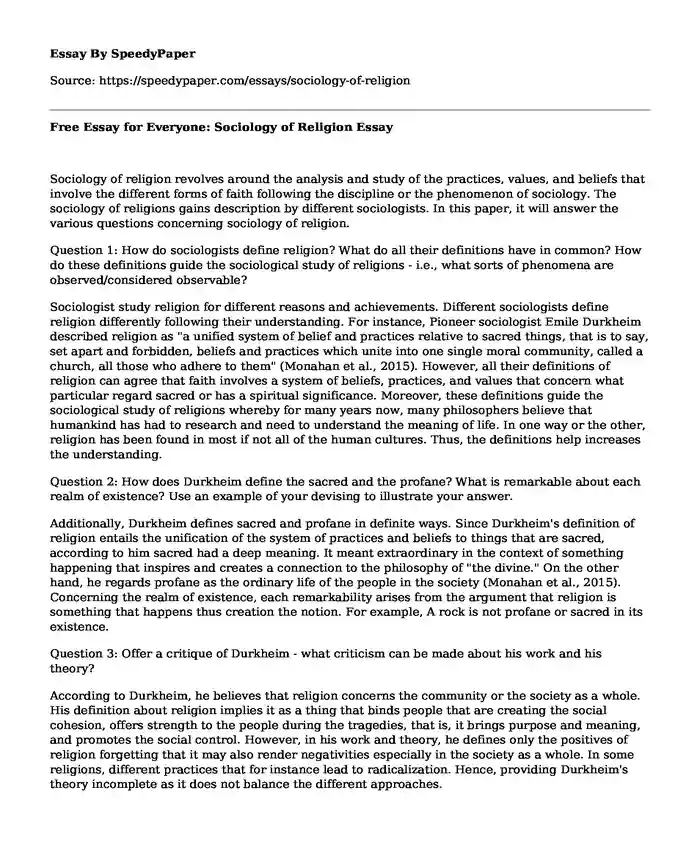Sociology of religion revolves around the analysis and study of the practices, values, and beliefs that involve the different forms of faith following the discipline or the phenomenon of sociology. The sociology of religions gains description by different sociologists. In this paper, it will answer the various questions concerning sociology of religion.
Question 1: How do sociologists define religion? What do all their definitions have in common? How do these definitions guide the sociological study of religions - i.e., what sorts of phenomena are observed/considered observable?
Sociologist study religion for different reasons and achievements. Different sociologists define religion differently following their understanding. For instance, Pioneer sociologist Emile Durkheim described religion as "a unified system of belief and practices relative to sacred things, that is to say, set apart and forbidden, beliefs and practices which unite into one single moral community, called a church, all those who adhere to them" (Monahan et al., 2015). However, all their definitions of religion can agree that faith involves a system of beliefs, practices, and values that concern what particular regard sacred or has a spiritual significance. Moreover, these definitions guide the sociological study of religions whereby for many years now, many philosophers believe that humankind has had to research and need to understand the meaning of life. In one way or the other, religion has been found in most if not all of the human cultures. Thus, the definitions help increases the understanding.
Question 2: How does Durkheim define the sacred and the profane? What is remarkable about each realm of existence? Use an example of your devising to illustrate your answer.
Additionally, Durkheim defines sacred and profane in definite ways. Since Durkheim's definition of religion entails the unification of the system of practices and beliefs to things that are sacred, according to him sacred had a deep meaning. It meant extraordinary in the context of something happening that inspires and creates a connection to the philosophy of "the divine." On the other hand, he regards profane as the ordinary life of the people in the society (Monahan et al., 2015). Concerning the realm of existence, each remarkability arises from the argument that religion is something that happens thus creation the notion. For example, A rock is not profane or sacred in its existence.
Question 3: Offer a critique of Durkheim - what criticism can be made about his work and his theory?
According to Durkheim, he believes that religion concerns the community or the society as a whole. His definition about religion implies it as a thing that binds people that are creating the social cohesion, offers strength to the people during the tragedies, that is, it brings purpose and meaning, and promotes the social control. However, in his work and theory, he defines only the positives of religion forgetting that it may also render negativities especially in the society as a whole. In some religions, different practices that for instance lead to radicalization. Hence, providing Durkheim's theory incomplete as it does not balance the different approaches.
Question 4: Explain how Berger theorizes that humans create religion and society, and then how religion and culture create humans.
As for Berger's theory, he theorizes that human create society and religion, and the faith and community create a human in that, he implies that society is a product of the humankind that is rooted in the phenomenon concerning the involvement of humans to religion. The community would constitute of both materials and non-materials. However, although all cultures evolve from the consciousness of the human beings, the religion and society exist because the human nature is there and they bring the meaning of life. Also, the religion and culture create the humans in the notion that they guide them on what life entails (Monahan et al., 2015). Berger elaborates on the interrelationship and the existence of religion in the society.
Question 5: Offer an explanation and analysis of Marx's statement "religion is the opiate of the masses."
The quote by Karl Marx is a quote written during a period where there were numerous uprisings that the oppressed working classes brought up as they were living in adverse conditions and low wages. Marx tries to elaborate how religion's aim and purpose is to make a creation of illusory fantasies aimed at the poor. It develops how economic realities prevent the people from finding the true meaning of life and religion tries to comfort them that it is okay as they will see the real sense of life and happiness in the next life. Even though he criticizes religion, he sympathizes as he argues that people are distressed and religion assumed the provision of solace, comparing it to an individual that is physically hurt receiving relief through the opiate drugs (Monahan et al., 2015). Marx considered religion inseparable from the workers and the economy as a whole.
Works Cited
Monahan, Susanne C., William Mirola, and Michael Emerson, eds. Sociology of Religion: A Reader. Routledge, 2015.
Cite this page
Free Essay for Everyone: Sociology of Religion. (2022, Mar 09). Retrieved from https://speedypaper.net/essays/sociology-of-religion
Request Removal
If you are the original author of this essay and no longer wish to have it published on the SpeedyPaper website, please click below to request its removal:
- Captain Vere Versus Social World - Essay Sample on Billy Budd
- Free Essay Sample on the History of Latin America
- Free Essay Describing Contemporary Issues in Psychology
- The Costs and Benefits of Sarbanes Act, Free Essay with Full Article Citation
- Mass Communication in Macau Arts Festival, Free Essay Example
- Paper Example on Security Risk Assessment Scheduling
- Essay Sample on Patient Healthcare Literacy
Popular categories





